A British Country Mystery in Space: Murder on Usher’s Planet by Atanielle Annyn Noël
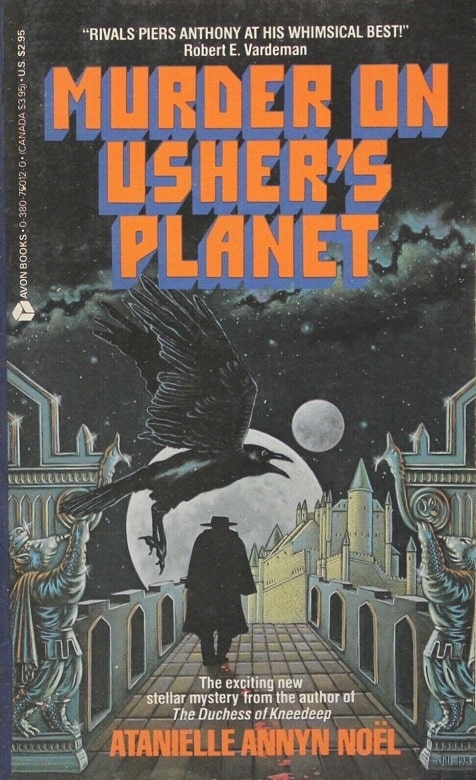 |
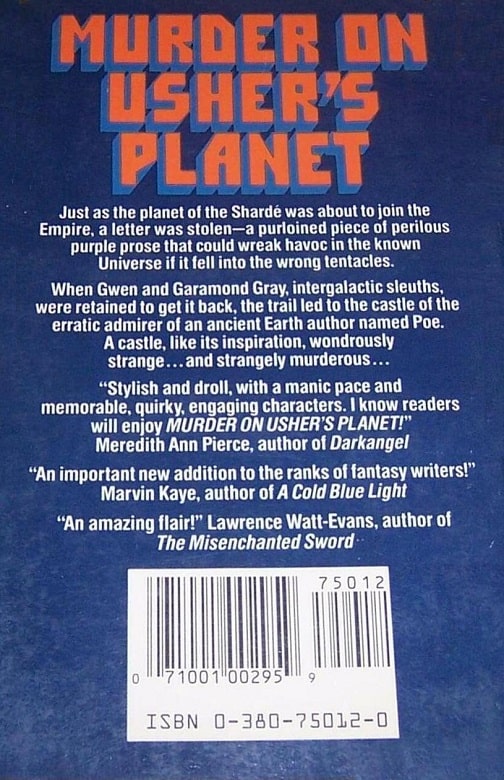 |
Murder on Usher’s Planet (Avon, April 1987). Cover by Jill Bauman
I’m going to be reviewing a few novels, of ‘70s/’80s vintage, that were foisted on me generously given to me by Black Gate’s panjandrum, John O’Neill. For his sins, he gets to publish these reviews here in Black Gate!
I exaggerate – I bought some of these novels of my own volition (though often because John alerted me to their existence with a Black Gate Vintage Treasures article!) and I am sincerely grateful to John for those he did give to me, and those he made me aware of, either by pointing them out at a convention, or by writing about them. The novels I’m looking at now do cluster in the ‘70s and ‘80s – a period James Davis Nicoll likes to call the “Disco Era.” And I think it’s worthwhile to consider books from that period – when I was a teenager or a newly hatched adult – especially the more obscure books. But this does mean a good many of these reviews might not be, er, entirely positive!
The first review to fit this paradigm might be my look at Mick Farren’s The Song of Phaid the Gambler (1981). And now we come to Murder on Usher’s Planet, by Atanielle Annyn Noël, published by Avon in 1987 (just as the Phaid the Gambler books appeared in the US.) This actually was a gift from John – we were wandering through the dealers’ room at the Chicago Pulp and Paper convention a few months ago, and I noticed this book, largely I think because of the author’s unusual name; and John grabbed it (along with a few others for himself, as I recall), and having bought it, pressed it on me – suggesting that if I read it I should review it for Black Gate. And here we are!
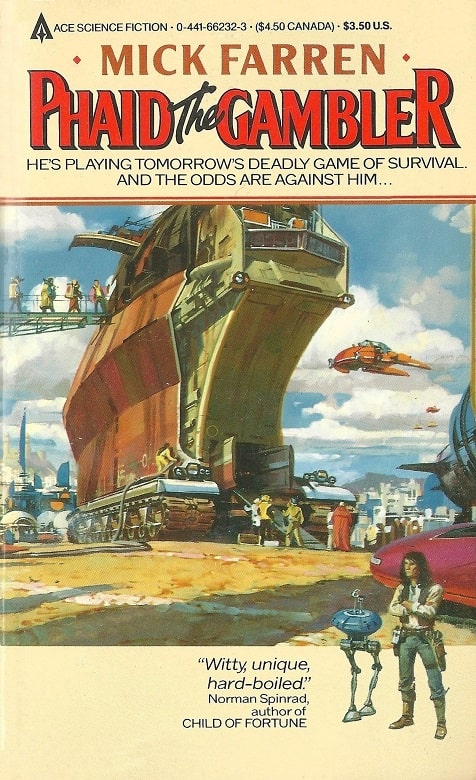 |
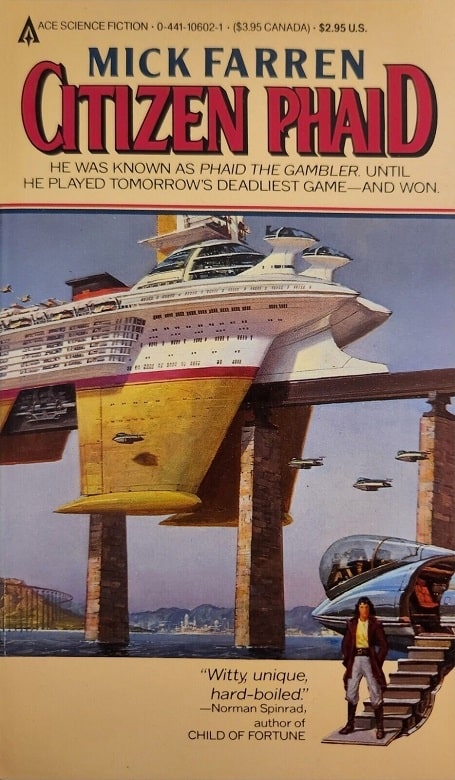 |
Phaid the Gambler and Citizen Phaid by Mick Farren
(Ace, August 1986 and January 1987). Covers by Jim Gurney
So – to the author’s name. I was not surprised to learn that Atanielle Annyn Noël was not given that name by her parents. I’m not entirely sure what her full birth name was – the Science Fiction Encyclopedia says that she published two studies of J. R. R. Tolkien in the 1970s as Ruth S. Noel, and that her legal name at that time was Ruth Helen Swycaffer Noel. She was born in 1947, I believe as Ruth Helen Swycaffer. It seems that Noel is her married surname though I suppose she may have chosen it herself. In about 1981 she legally changed her name to Atanielle Annyn Noël, and her fiction – two stories for Dragon Magazine, and three novels, was published under that name.
Noël is still living, as far as I know, but according to the ISFDB her only publication since this novel appeared in 1987 has been a letter to Locus in 1992, signed Atanielle A. Rowland. (As Murder on Usher’s Planet is dedicated to Kevin Michael Rowland, I’m inclined to think that Noël married Rowland before 1992.) I have read the letter, and it is primarily a sweet piece of praise for Locus – but it also includes a nugget of personal information: she mentions her brother, Jefferson Swycaffer. And, in fact, Jefferson P. Swycaffer, born in 1956, is also a writer of SF and Fantasy. He began publishing fiction with a story for Andrew J. Offutt’s Swords Against Darkness IV in 1979. He has published a couple of dozen short stories (the most recent in 2017), and nine novels, most of them in the Concordat series, based on the venerable game Traveller.
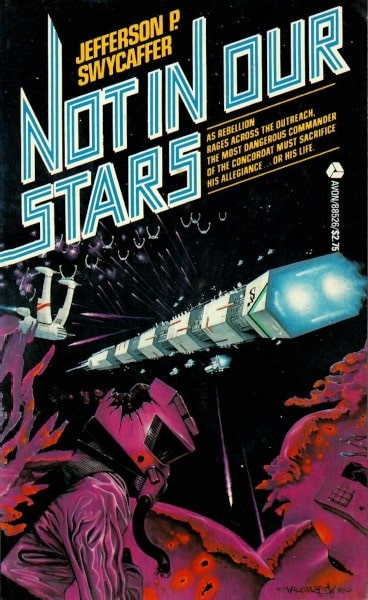 |
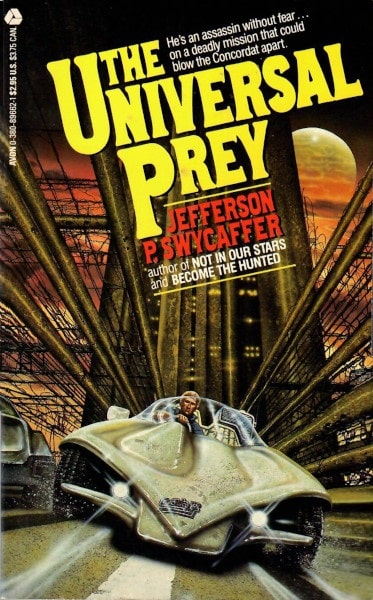 |
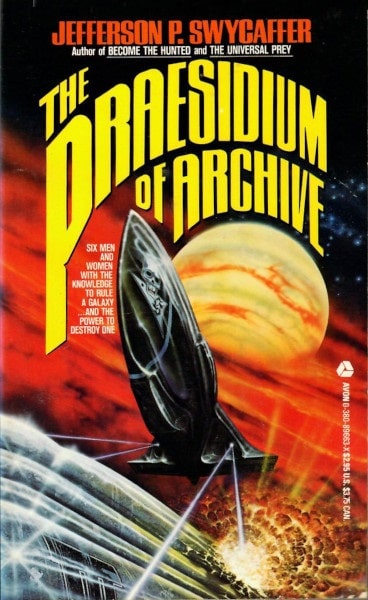 |
Novels in the Traveller-inspired Concordat series by Jefferson P. Swycaffer:
Not in Our Stars, The Universal Prey, and The Praesidium of Archive (Avon,
1984, 1985, 1985). Covers: Wayne Barlowe (left), rest unknown
Murder on Usher’s Planet is not set on Usher’s Planet (there is no Usher’s Planet) – instead it is set on Shardworld. This is a planet populated by a mix of humans and the native Shardé, in what seems a generally pleasant future dominated by the Oriel-Mossmarching Empire. Shardworld itself has been independent, but is just about to join the Empire. Garamond and Gwen Gray are “kissing cousins” (in the sense of “sleeping together second cousins”) who operate a detective agency, and they have been hired by the Governor to track down a diplomatically sensitive document that, if it got into the wrong hands, could jeopardize Shardwold’s entry into the Empire. The document has ended up at the house of a man who has named himself Roderick Usher, and has decorated his vast manor to imitate the House of Usher from Poe’s story.
Usher habitually hosts a gaggle of artistic sorts, who play up to his obsession with Poe and exaggerated emotional states. Gwen and Garamond decide to try to mix with the guests, and so does Gaust Kennes, the Governor’s assistant who is in love with the Governor’s daughter, Lady Maudeline, and who suspects that she was responsible for letting the sensitive document get into Usher’s possession. Lady Maudeline herself seems to be interested in a couple of men: Usher himself, and a musician named Siphuncle. The crowd at the manor also includes Siphuncle’s current mistress, a singer named Svarabakti; as well as a mixed set of other artistes, both human and Shardé.
The whole setup is really aimed at light comedy. There is a murder, and a somewhat scrambled attempt to solve that while also retrieving the document. But all is mixed with a series of romantic tangles, and silly Poe-based jokes, and frantic efforts by the Grays to break into the manor and search it, while Kennes tries to attract Maudeline’s attention. The servants are involved, sort of a parody of traditional British country house butlers, cooks and maids. There is alliteration, limericks, sexual intrigue – leading to a somewhat unconvincing solution to the mysteries, as well as a lot of marriages.
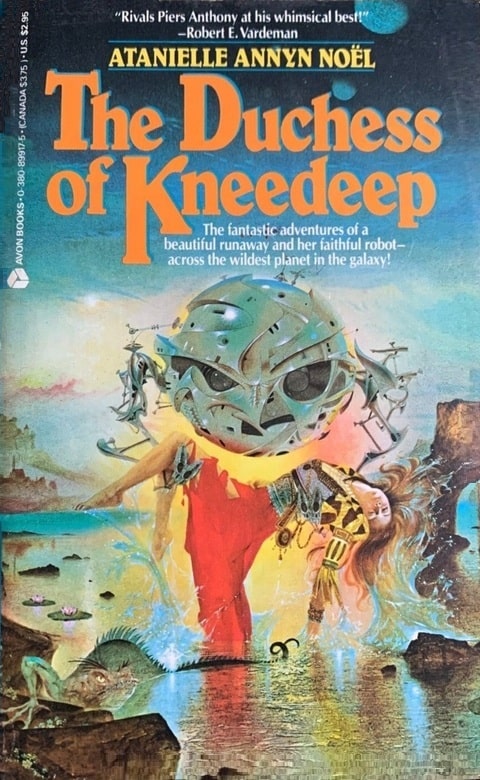 |
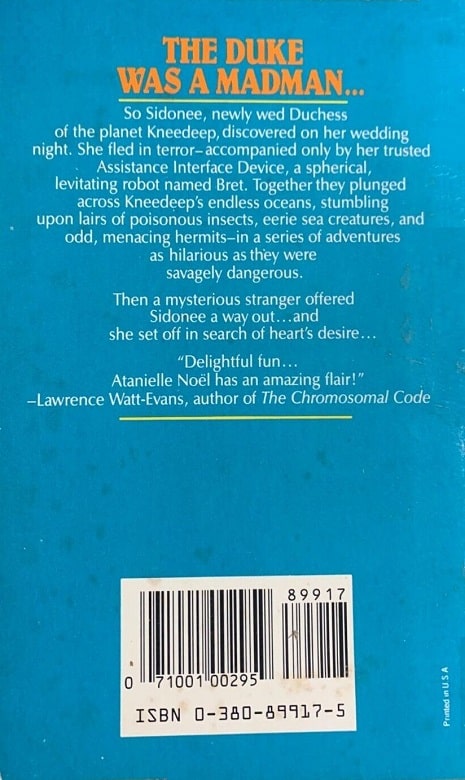 |
The Duchess of Kneedeep (Avon, March 1986). Cover by Richard Bober
It’s – not bad, but not great either. It’s fitfully funny, and the prose is OK, sometimes clever, sometimes falling a bit flat. The action is disconnected and sort of random but proceeds at a breathless enough pace we don’t really notice.
And that’s not really the point. The point is banter, whimsy, light romance. I didn’t love it, but I didn’t mind reading it, and I may try Noël’s other novel set in the Oriel-Mossmarching Empire, The Duchess of Kneedeep. This may seem like damning with faint praise, and I dare say it is… but, hey, I was entertained, and sometimes that’s all you need.
Rich Horton’s last article for us was a review of The Song of Phaid the Gambler by Mick Farren. His website is Strange at Ecbatan. Rich has written over 200 articles for Black Gate, see them all here.
Excellent detective work on the name! The only thing missing is that “Atanielle” was originally “Ataniel,” which was intended to be Sindarin, I believe. The spelling was changed after too many people pronounced it to rhyme with “Daniel,” giving it three syllables rather than four.
I found The Duchess of Kneedeep more fun than Murder on Usher’s Planet. I would recommend giving it a look.
Hi William,
Thanks for the additional info! What’s your source for all this delightful info about Ms. Noël? Do you have a connection to the author?
When I lived in San Diego, her brother, Jefferson Swycaffer, and I played in each other’s role-playing campaigns. I used to go to social events at her home out in Ramona, and she and I were members of the same amateur press association for a long time. In fact it was at one of those events that I offered to exchange phone numbers with the woman I’m now married to. And there was another one where Jefferson and I, who had been having some heated discussions, settled our differences with a pillowfight.
Thanks, William! Makes sense she’d have chosen a Sindarin name!
I have bought a copy of The Duchess of Kneedeep and I will get to it sometime!